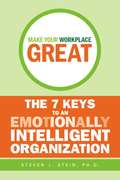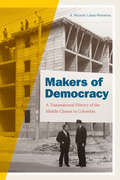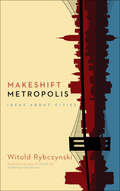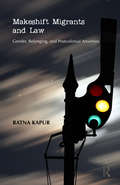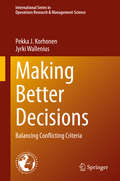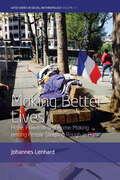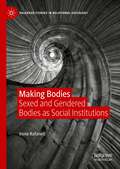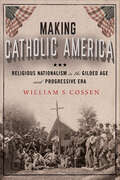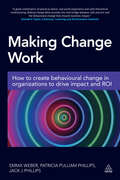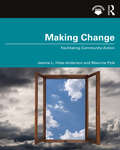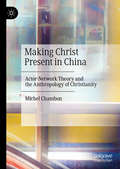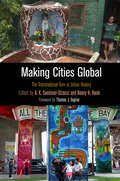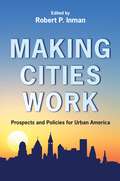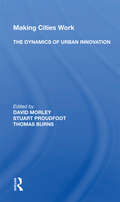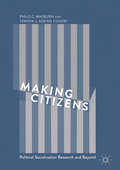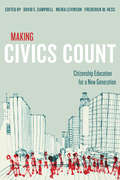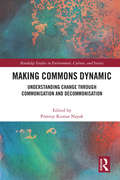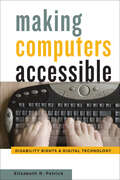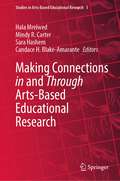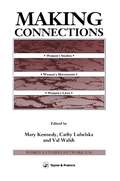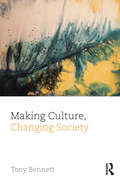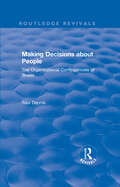- Table View
- List View
Make Your Workplace Great: The 7 Keys to an Emotionally Intelligent Organization (Jossey-Bass Leadership Series - Canada #12)
by Steven J. SteinWhat Steven J. Stein found out about creating and sustaining great workplaces The proprietary and cutting-edge research carried out by the author led to outcomes that shed new light on management practice and strategy. The 7 Keys presented in this book, when implemented, will produce immediate results and long-term enhanced performance. You will be privy to what the author has learned about the changing workplace and the role leaders play in maximizing their workforce. You can fill an organization with all the intelligent and highly educated people you want, but without the right culture and discipline, your chances of success are in doubt. Use this book to see how your organization measures up to the 7 Keys and implement the necessary changes to make your workplace a happier and more productive one. The 7 keys Hire capable people who love the work they do and show how they contribute to the bigger picture. Compensate people fairly. Don't overwork (or underwork) people. Build strong teams with shared purpose and viable goals. Make sure managers can manage. Treat people with respect and leverage their unique talents. Be proactively responsible by doing the right things to win the hearts and minds of your people.
Makers of Democracy: A Transnational History of the Middle Classes in Colombia (Radical Perspectives)
by A. Ricardo López-PedrerosIn Makers of Democracy A. Ricardo López-Pedreros traces the ways in which a thriving middle class was understood to be a foundational marker of democracy in Colombia during the second half of the twentieth century. Drawing on a wide array of sources ranging from training manuals and oral histories to school and business archives, López-Pedreros shows how the Colombian middle class created a model of democracy based on free-market ideologies, private property rights, material inequality, and an emphasis on a masculine work culture. This model, which naturalized class and gender hierarchies, provided the groundwork for Colombia's later adoption of neoliberalism and inspired the emergence of alternate models of democracy and social hierarchies in the 1960s and 1970s that helped foment political radicalization. By highlighting the contested relationships between class, gender, economics, and politics, López-Pedreros theorizes democracy as a historically unstable practice that exacerbated multiple forms of domination, thereby prompting a rethinking of the formation of democracies throughout the Americas.
Makeshift Metropolis
by Witold RybczynskiIn this new work, prizewinning author, professor, and Slate architecture critic Witold Rybczynski returns to the territory he knows best: writing about the way people live, just as he did in the acclaimed bestsellers Home and A Clearing in the Distance. In Makeshift Metropolis, Rybczynski has drawn upon a lifetime of observing cities to craft a concise and insightful book that is at once an intellectual history and a masterful critique. Makeshift Metropolis describes how current ideas about urban planning evolved from the movements that defined the twentieth century, such as City Beautiful, the Garden City, and the seminal ideas of Frank Lloyd Wright and Jane Jacobs. If the twentieth century was the age of planning, we now find ourselves in the age of the market, Rybczynski argues, where entrepreneurial developers are shaping the twenty-first-century city with mixed-use developments, downtown living, heterogeneity, density, and liveliness. He introduces readers to projects like Brooklyn Bridge Park, the Yards in Washington, D.C., and, further afield, to the new city of Modi'in, Israel--sites that, in this age of resource scarcity, economic turmoil, and changing human demands, challenge our notion of the city. Erudite and immensely engaging, Makeshift Metropolis is an affirmation of Rybczynski's role as one of our most original thinkers on the way we live today.
Makeshift Metropolis: Ideas about Cities
by Witold RybczynskiIn this new work, prizewinning author, professor, and Slate architecture critic Witold Rybczynski returns to the territory he knows best: writing about the way people live, just as he did in the acclaimed bestsellers Home and A Clearing in the Distance. In Makeshift Metropolis, Rybczynski has drawn upon a lifetime of observing cities to craft a concise and insightful book that is at once an intellectual history and a masterful critique. Makeshift Metropolis describes how current ideas about urban planning evolved from the movements that defined the twentieth century, such as City Beautiful, the Garden City, and the seminal ideas of Frank Lloyd Wright and Jane Jacobs. If the twentieth century was the age of planning, we now find ourselves in the age of the market, Rybczynski argues, where entrepreneurial developers are shaping the twenty-first-century city with mixed-use developments, downtown living, heterogeneity, density, and liveliness. He introduces readers to projects like Brooklyn Bridge Park, the Yards in Washington, D.C., and, further afield, to the new city of Modi'in, Israel--sites that, in this age of resource scarcity, economic turmoil, and changing human demands, challenge our notion of the city. Erudite and immensely engaging, Makeshift Metropolis is an affirmation of Rybczynski's role as one of our most original thinkers on the way we live today.
Makeshift Migrants and Law: Gender, Belonging, and Postcolonial Anxieties
by Ratna KapurThis book unmasks the cultural and gender stereotypes that inform the legal regulation of the migrant. It critiques the postcolonial perspective on how belonging and non-belonging are determined by the sexual, cultural, and familial norms on which law is based as well as the historical backdrop of the colonial encounter, which differentiated overtly between the legitimate and illegitimate subject. The complexities and layering of the migrant’s existence are seen, in the book, to be obscured by the apparatus of the law. The author elaborates on how law can both advance and impede the rights of the migrant subject and how legal interventions are constructed around frameworks rooted in the boundaries of difference, protection of the sovereignty of the nation-state, and the myth of the all-embracing liberal subject. This produces the ‘Other’ and reinforces essentialised assumptions about gender and cultural difference. The author foregrounds the perspective of the subaltern migrant subject, exposing the deeper issues implicated in the debates over migration and the rights claims of migrants, primarily in the context of women and religious minorities in India.
Making Better Decisions: Balancing Conflicting Criteria (International Series in Operations Research & Management Science #294)
by Jyrki Wallenius Pekka J. KorhonenThis book offers a comprehensive introduction to decision-making in an MCDM framework. Designed as a tutorial, it presents the main concepts and methods to be applied, together with essential background information. This includes the concept of nondominance, Simon’s bounded rationality, Tversky and Kahneman’s prospect theory, and the concepts of behavioral vs. mathematical convergence and premature stopping put forward by Korhonen, Moskowitz and Wallenius. The book concludes with a non-technical review of many popular decision algorithms, including the Analytic Hierarchy Process (AHP), VIMDA, and a number of classic interactive man-machine algorithms. In essence, the book is a “one-stop” source on everything you need to know about managerial decision-making in the multiple-criteria setting.
Making Better Lives: Hope, Freedom and Home-Making among People Sleeping Rough in Paris (WYSE Series in Social Anthropology #11)
by Johannes LenhardIn this ethnographic study, Johannes Lenhard observes the daily practices, routines and techniques of people who are sleeping rough on the streets of Paris. The book focusses on their survival practises, their short-term desires and hopes, how they earn money through begging, how they choose the best place to sleep at night and what role drugs and alcohol play in their lives. The book also follows people through different institutional settings, including a homeless day centre, a needle exchange, a centre for people with alcohol problems and a homeless shelter.
Making Better Lives: Hope, Freedom and Home-Making among People Sleeping Rough in Paris (WYSE Series in Social Anthropology #11)
by Johannes LenhardIn this ethnographic study, Johannes Lenhard observes the daily practices, routines and techniques of people who are sleeping rough on the streets of Paris. The book focusses on their survival practises, their short-term desires and hopes, how they earn money through begging, how they choose the best place to sleep at night and what role drugs and alcohol play in their lives. The book also follows people through different institutional settings, including a homeless day centre, a needle exchange, a centre for people with alcohol problems and a homeless shelter.
Making Bodies: Sexed and Gendered Bodies as Social Institutions (Palgrave Studies in Relational Sociology)
by Irene RafanellThis book presents a novel theoretical account of the claim that sexed and gendered bodies are socially constructed. In order to do so it critically reconstructs and combines existing theories of the embodiment of social identity (Bourdieu, Foucault, Butler) with the constructionist account of the Sociology of Knowledge (Strong Programme). This allows the author to develop a detailed conceptual apparatus which helps to analyse the nature of sexed and gendered bodies as social institutions. This book argues for a view of the body as an ‘artificial kind’ of entity which is the effect of contingent and localized practices and that incorporates both social and natural determinants. In doing so, the book reformulates key sociological dichotomies such as nature/society; structure/agency and domination/resistance, critically analysing different structuralist positions and advancing an ‘intrinsic’ structuralist model which foregrounds the importance of human relations in the constitution of social phenomena. This theoretical investigation has important methodological implications for empirical research into the formation of sex and gender identities and practices, enabling a more objective and naturalistic approach to empirical data concerning social phenomena.
Making Catholic America: Religious Nationalism in the Gilded Age and Progressive Era
by William S. CossenIn Making Catholic America, William S. Cossen shows how Catholic men and women worked to prove themselves to be model American citizens in the decades between the Civil War and the Great Depression. Far from being outsiders in American history, Catholics took command of public life in the early twentieth century, claiming leadership in the growing American nation. They produced their own version of American history and claimed the power to remake the nation in their own image, arguing that they were the country's most faithful supporters of freedom and liberty and that their church had birthed American independence. Making Catholic America offers a new interpretation of American life in the Gilded Age and Progressive Era, demonstrating the surprising success of an often-embattled religious group in securing for itself a place in the national community and in profoundly altering what it meant to be an American in the modern world.
Making Change Work: How to Create Behavioural Change in Organizations to Drive Impact and ROI
by Patricia Pulliam Phillips Emma Weber Dr Jack PhillipsUnderpinned by decades of research and application, Making Change Work shows that the lynchpin that connects change initiatives and their ultimate success is behavioural change. The book brings together the ROI Institute's established methodology for aligning projects and programmes to business needs and for evaluating impact and ROI with the Turning Learning Into Action methodology developed by Emma Weber to support learning transfer. It offers a step-by-step process that partners with any business initiative requiring behavioural change, providing the critical link bridging the knowledge and application. At the heart of the methodology is a framework for reflective conversation, ensuring accountability and aligning people to the desired outcomes. Cutting through complex change theory, Making Change Work is a 'how to' guide, providing an end-to-end approach to solve the problem that businesses have grappled with for so long from change projects that don't deliver business impact. It includes real life case studies from organizations such as BMW and the University of NSW Department of Innovation on how organizations are using the framework to create successful outcomes that are not just demonstrated but that are delivered and measurable. It is ideal for any professional who is embarking on any organizational initiative requiring change and evaluation of the subsequent ROI, whether it is a learning initiative, quality initiative or change initiative.
Making Change: Facilitating Community Action
by Jeanne L Hites Anderson Maurine H PyleEvery community has issues or opportunities that need to be addressed. The expert knowledge of community members could be the key to creating lasting change. By making community members into facilitators, Making Change: Facilitating Community Action suggests they can guide community members through the process of making change and to help them determine their goals and methods. The aim of this book is to enable facilitators to identify concerns and address, enable and foster change at the local level through effective facilitation. This book follows a six-stage model for creating change. Beginning with issue awareness, it continues through getting to know the team they are working with, seeking information on the issue and community, through facilitating the planning and community development through evaluation. This book focuses on the human side of the change process while also teaching the practical skills necessary for individuals to reach their goal. Making Change is for people interested in making change to improve their community, including students, community activists, local government and educational leaders.
Making Christ Present in China: Actor-Network Theory and the Anthropology of Christianity
by Michel ChambonAn anthropological theorization of the unity and diversity of Christianity, this book focuses on Christian communities in Nanping, a small city in China. It applies methodological insights from Actor-Network Theory to investigate how the Christian God is made part of local social networks. The study examines how Christians interact with and re-define material objects, such as buildings, pews, offerings, and blood, in order to identify the kind of networks and non-human actors that they collectively design. By comparing local Christian traditions with other practices informing the Nanping religious landscape, the study points out potential cohesion via the centralizing presence of the Christian God, the governing nature of the pastoral clergy, and the semi-transcendent being of the Church.
Making Cities Global: The Transnational Turn in Urban History
by Thomas J. Sugrue Nancy H. Kwak A. K. Sandoval-StrauszIn recent decades, hundreds of millions of people across the world have moved from rural areas to metropolitan regions, some of them crossing national borders on the way. While urbanization and globalization are proceeding with an intensity that seems unprecedented, these are only the most recent iterations of long-term transformations—cities have for centuries served as vital points of contact between different peoples, economies, and cultures. Making Cities Global explores the intertwined development of urbanization and globalization using a historical approach that demonstrates the many forms transnationalism has taken, each shaped by the circumstances of a particular time and place. It also emphasizes that globalization has not been persistent or automatic—many people have been as likely to resist or reject outside connections as to establish or embrace them.The essays in the collection revolve around three foundational themes. The first is an emphasis on connections among the United States, East and Southeast Asia, Latin America, and South Asia. Second, contributors ground their studies of globalization in the built environments and everyday interactions of the city, because even world-spanning practices must be understood as people experience them in their neighborhoods, workplaces, stores, and streets. Last is a fundamental concern with the role powerful empires and nation-states play in the emergence of globalizing and urbanizing processes.Making Cities Global argues that combining urban history with a transnational approach leads to a richer understanding of our increasingly interconnected world. In order to achieve prosperity, peace, and sustainability in metropolitan areas in the present and into the future, we must understand their historical origins and development.Contributors: Erica Allen-Kim, Leandro Benmergui, Matt Garcia, Richard Harris, Carola Hein, Nancy Kwak, Carl Nightingale, Amy C. Offner, Margaret O'Mara, Nikhil Rao, A. K. Sandoval-Strausz, Arijit Sen, Thomas J. Sugrue.
Making Cities Work: Prospects and Policies for Urban America
by Robert P. InmanMaking Cities Work brings together leading writers and scholars on urban America to offer critical perspectives on how to sustain prosperous, livable cities in today's fast-evolving economy. Successful cities provide jobs, quality schools, safe and clean neighborhoods, effective transportation, and welcoming spaces for all residents. But cities must be managed well if they are to remain attractive places to work, relax, and raise a family; otherwise residents, firms, and workers will leave and the social and economic advantages of city living will be lost. Drawing on cutting-edge research in the social sciences, the contributors explore optimal ways to manage the modern city and propose solutions to today's most pressing urban problems. Topics include the urban economy, transportation, housing and open space, immigration, race, the impacts of poverty on children, education, crime, and financing and managing services. The contributors show how to make cities work for diverse urban constituencies, and why we still need cities despite the many challenges they pose. Making Cities Work brings the latest findings in urban economics to policymakers, researchers, and students, as well as anyone interested in urban affairs. In addition to the editor, the contributors are David Card, Philip J. Cook, Janet Currie, Edward L. Glaeser, Joseph Gyourko, Richard J. Murnane, Witold Rybczynski, Kenneth A. Small, and Jacob L. Vigdor.
Making Cities Work: The Dynamics Of Urban Innovation
by David Morley Thomas Burns Stuart ProudfootThis book is an outcome of the conference 'Urban Innovation: Working Solutions to the Problems of Human Settlement' held in 1977. It focuses on urban innovations as working alternatives that reflect an institutional capacity to adapt complex human systems in response to basic environmental change.
Making Citizens
by Philo C. Wasburn Tawnya J. Adkins CovertThis book assembles what political scientists, sociologists, and communication analysts have learned in almost six decades of research on political socialization (the lifelong process by which we acquire political beliefs). It also explores how people develop political values, attitudes, identities, and behavioral dispositions. Of particular interest to Philo C. Wasburn and Tawnya J. Adkins Covert is the process by which people are made into active citizens who are politically interested, informed, partisan, tolerant, and engaged. Finally, Wasburn and Adkins Covert identify some suggestions for institutional change that would lead to "better" citizenship.
Making Civics Count: Citizenship Education for a New Generation
by David E. Campbell Meira Levinson Frederick M. Hess"By nearly every measure, Americans are less engaged in their communities and political activity than generations past." So write the editors of this volume, who survey the current practices and history of citizenship education in the United States. They argue that the current period of "creative destruction"--when schools are closing and opening in response to reform mandates--is an ideal time to take an in-depth look at how successful strategies and programs promote civic education and good citizenship.Making Civics Count offers research-based insights into what diverse students and teachers know and do as civic actors, and proposes a blueprint for civic education for a new generation that is both practical and visionary.
Making Civics Count: Citizenship Education for a New Generation
by David E. Campbell"By nearly every measure, Americans are less engaged in their communities and political activity than generations past.&” So write the editors of this volume, who survey the current practices and history of citizenship education in the United States. They argue that the current period of &“creative destruction&”—when schools are closing and opening in response to reform mandates—is an ideal time to take an in-depth look at how successful strategies and programs promote civic education and good citizenship.Making Civics Count offers research-based insights into what diverse students and teachers know and do as civic actors, and proposes a blueprint for civic education for a new generation that is both practical and visionary.
Making Commons Dynamic: Understanding Change Through Commonisation and Decommonisation (Routledge Studies in Environment, Culture, and Society)
by Prateep Kumar NayakWith an emphasis on the challenges of sustaining the commons across local to global scales, Making Commons Dynamic examines the empirical basis of theorising the concepts of commonisation and decommonisation as a way to understand commons as a process and offers analytical directions for policy and practice that can potentially help maintain commons as commons in the future. Focusing on commonisation–decommonisation as an analytical framework useful to examine and respond to changes in the commons, the chapter contributions explore how natural resources are commonised and decommonised through the influence of multi-level internal and external drivers, and their implications for commons governance across disparate geographical and temporal contexts. It draws from a large number of geographically diverse empirical cases – 20 countries in North, South, and Central America and South- and South-East Asia. They involve a wide range of commons – related to fisheries, forests, grazing, wetlands, coastal-marine, rivers and dams, aquaculture, wildlife, tourism, groundwater, surface freshwater, mountains, small islands, social movements, and climate. The book is a transdisciplinary endeavour with contributions by scholars from geography, history, sociology, anthropology, political studies, planning, human ecology, cultural and applied ecology, environmental and development studies, environmental science and technology, public policy, Indigenous/tribal studies, Latin American and Asian studies, and environmental change and governance, and authors representing the commons community, NGOs, and policy. Contributors include academics, community members, NGOs, practitioners, and policymakers. Therefore, commonisation–decommonisation lessons drawn from these chapters are well suited for contributing to the practice, policy, and theory of the commons, both locally and globally.
Making Computers Accessible: Disability Rights and Digital Technology
by Elizabeth R. PetrickThe revolution in accessible computer technology was fueled by disability activism, the interactive nature of personal computers, and changing public policy.In 1974, not long after developing the first universal optical character recognition technology, Raymond Kurzweil struck up a conversation with a blind man on a flight. Kurzweil explained that he was searching for a use for his new software. The blind man expressed interest: One of the frustrating obstacles that blind people grappled with, he said, was that no computer program could translate text into speech. Inspired by this chance meeting, Kurzweil decided that he must put his new innovation to work to "overcome this principal handicap of blindness." By 1976, he had built a working prototype, which he dubbed the Kurzweil Reading Machine.This type of innovation demonstrated the possibilities of computers to dramatically improve the lives of people living with disabilities. In Making Computers Accessible, Elizabeth R. Petrick tells the compelling story of how computer engineers and corporations gradually became aware of the need to make computers accessible for all people. Motivated by user feedback and prompted by legislation such as the Americans with Disabilities Act, which offered the promise of equal rights via technological accommodation, companies developed sophisticated computerized devices and software to bridge the accessibility gap. People with disabilities, Petrick argues, are paradigmatic computer users, demonstrating the personal computer’s potential to augment human abilities and provide for new forms of social, professional, and political participation. Bridging the history of technology, science and technology studies, and disability studies, this book traces the psychological, cultural, and economic evolution of a consumer culture aimed at individuals with disabilities, who increasingly rely on personal computers to make their lives richer and more interconnected.
Making Connections in and Through Arts-Based Educational Research (Studies in Arts-Based Educational Research #5)
by Mindy R. Carter Hala Mreiwed Sara Hashem Candace H. Blake-AmaranteThis book explores the connections made in and through arts-based educational research through four themes: socially engaged connections, cultural connections, personal and pedagogical connections, and making connections during the COVID-19 pandemic. It emerges from the 3rd bi-annual 2020 Artful Inquiry Research Group symposium on the theme of “connections”. The symposium brought together artists, community members, teachers, students, and researchers through a virtual platform to examine the way(s) in which the arts can help connect people, ideas, and spaces/places in a pandemic reality. Art plays a predominant role in each chapter as authors weave their research and art-based understandings together. This book is a valuable teaching resource for undergraduate and postgraduate courses in teaching, anthropology, digital ethnography, autoethnography, cultural studies, and communications. It is of interest to higher education students, academic researchers, and teachers exploring arts-based methodologies in the fields of creative practice and creativity studies, communications, critical studies, sociology, sciences, teacher education, and the arts.
Making Connections: Women's Studies, Women's Movements, Women's Lives (Gender And Society Ser.)
by Mary Kennedy Cathy Lubelska Val WalshFirst Published in 1993. Routledge is an imprint of Taylor & Francis, an informa company.
Making Culture, Changing Society (CRESC)
by Tony BennettMaking Culture, Changing Society proposes a challenging new account of the relations between culture and society focused on how particular forms of cultural knowledge and expertise work on, order and transform society. Examining these forms of culture’s action on the social as aspects of a historically distinctive ensemble of cultural institutions, it considers the diverse ways in which culture has been produced and mobilised as a resource for governing populations. These concerns are illustrated in detailed case studies of how anthropological conceptions of the relations between race and culture have shaped – and been shaped by – the relationships between museums, fieldwork and governmental programmes in early twentieth-century France and Australia. These are complemented by a closely argued account of the relations between aesthetics and governance that, in contrast to conventional approaches, interprets the historical emergence of the autonomy of the aesthetic as vastly expanding the range of art’s social uses. In pursuing these concerns, particular attention is given to the role that the cultural disciplines have played in making up and distributing the freedoms through which modern forms of liberal government operate. An examination of the place that has been accorded habit as a route into the regulation of conduct within liberal social, cultural and political thought brings these questions into sharp focus. The book will be of interest to students and scholars of sociology, cultural studies, media studies, anthropology, museum and heritage studies, history, art history and cultural policy studies.
Making Decisions about People: The Organisational Contingencies of Illness (Routledge Revivals)
by Alex DennisThis title was first published in 2001. Engaging with both management science and interactionist sociology, this book employs a case study of stroke rehabilitation in hospitals to clarify a range of practical organizational concerns and conceptual issues related to decision making in complex organizations.
